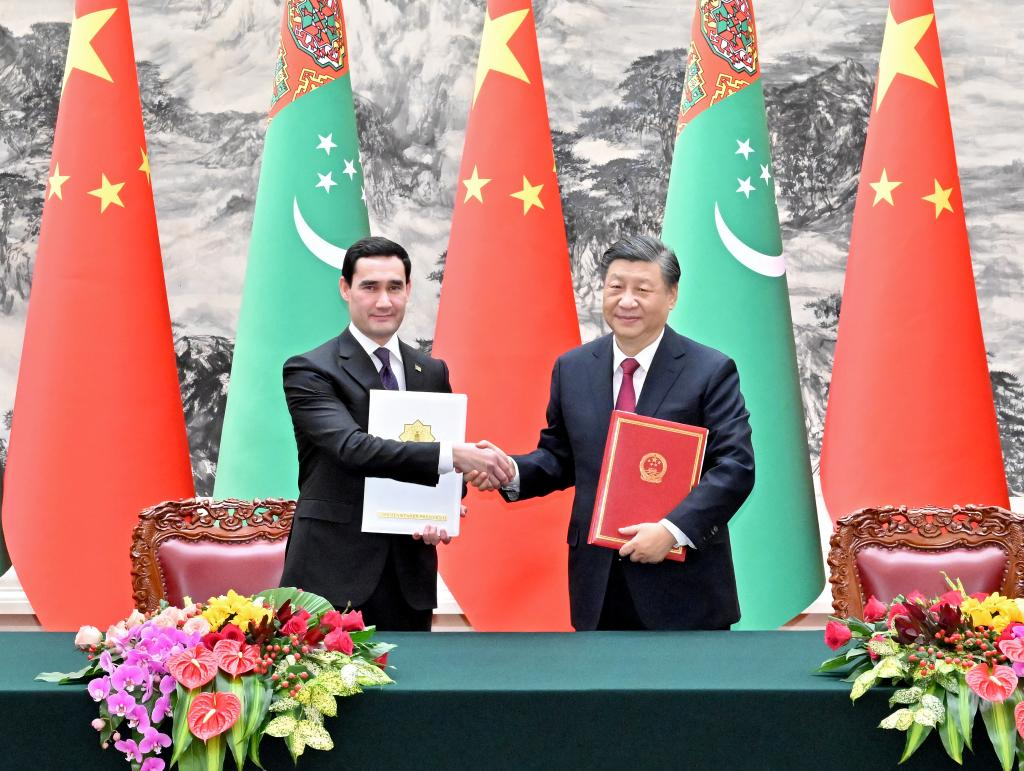Chinese President Xi Jinping has urged his Turkmen counterpart Serdar Berdimuhamedow to expand bilateral cooperation on energy, especially in the area of natural gas.
In a meeting with the visiting Turkmen president on January 6, Chinese President Xi Jinping said that natural gas cooperation is the "cornerstone of China-Turkmenistan relations and its expansion is in line with the strategic and long-term interests of both sides," according to the website of the Chinese Ministry of Foreign Affairs.
“The two sides need to advance cooperation on major projects at a faster pace, and unlock cooperation potential in such areas as green energy, natural gas utilization, energy technologies and equipment to promote cooperation across the industrial chain,” the Chinese leader added.
"China will support more capable Chinese companies in investing and doing businesses in Turkmenistan, and work expeditiously with Turkmenistan to promote connectivity and facilitate personnel inter-flow between the two countries," Xi Jinping said.
Xi Jinping also expressed Beijing's willingness to work with Turkmenistan to organise the "China+Central Asia" (C+C5) Summit, adding that China supports the "constructive cooperation between Turkmenistan and the Shanghai Cooperation Organisation".
During a two-day visit to Beijing, Berdimuhamedow said that Turkmenistan "firmly supports China in safeguarding national sovereignty and territorial integrity, and firmly opposes any attempt to divide China".
"Turkmenistan is willing to actively promote the 'Revival of the Silk Road' strategy with the 'Belt and Road' initiative, further expand economic and trade cooperation between the two countries, strengthen energy cooperation in areas such as natural gas, and promote cross-border railway and other interconnected construction for the benefit of the two peoples," he stated.
The two leaders announced the decision to elevate the bilateral relationship to the level of comprehensive strategic partnership, and they issued a joint statement and signed documents relating to natural gas, the Belt and Road initiative, green development, the digital economy, health, culture and media.
According to the signed statement, the two sides noted the need to intensify cooperation between the two countries in the field of connecting roads and cross-border transport, increasing the number of flights and the volume of transportation of China-Kyrgyzstan-Turkmenistan-Iran railway container trains and international multimodal transport China-Kyrgyzstan-Uzbekistan-Turkmenistan, according to the state-run Turkmenistan Today.
President Berdimuhamedow’s visit to China signals further strengthening of the bilateral relations between China and Turkmenistan. Turkmenistan is a key supplier of natural gas (30 to 40 percent) to China, with the two states having developed three gas pipelines in a project known as the China-Central Asia Gas Pipeline.
The 3,666 km-long Turkmenistan-China Gas Pipeline extends from Gedaim, which sits on the border between Turkmenistan and Uzbekistan, to Horgos, located in western China’s Xinjiang province. For the first 11 months of 2022, China's imports of Turkmen gas were valued at $9.3 billion, up from $6.79 billion in the whole of 2021, according to Chinese customs data.
China has paid for all the pipeline infrastructure to transport natural gas across four Central Asian states to China. Ashgabat is eager to forge ahead as the new pipeline would increase exports through the Central Asia-China gas network by 30 billion cubic meters (bcm) to a potential capacity of 85 bcm annually. That would provide additional revenue for the Turkmen government.
Turkmenistan, with its 13.6 trillion cubic meters (tcm) of proven gas reserves, is one of the Central Asian countries that the One Belt overland routes would cut through. Consequently, China has a major interest in ensuring stability in Turkmenistan to recoup its investment.
Turkmenistan also acts as a corridor for China to reach important import and export markets in south Asia, the Middle East, Eastern Europe and beyond, as well as access to the Caspian Sea, which lies on the country’s western border. Turkmenistan’s largest export market is China, which accounted for 76.6 per cent of all products in the first quarter of 2022.







 President Ilham Aliyev shed light on the evolving contours of the peace process with Armenia during an international conference in Baku this week. ...
President Ilham Aliyev shed light on the evolving contours of the peace process with Armenia during an international conference in Baku this week. ...
 Azerbaijan and Armenia started the process of demarcation of their border on Tuesday, with the installation of the first border markers based on ge...
Azerbaijan and Armenia started the process of demarcation of their border on Tuesday, with the installation of the first border markers based on ge...
 Armenian sappers commenced on Monday mine-clearance operations in the territories adjacent to the Saint Mary Church in village of Voskepar (Armenia...
Armenian sappers commenced on Monday mine-clearance operations in the territories adjacent to the Saint Mary Church in village of Voskepar (Armenia...
 Iran and Pakistan have signed eight cooperation documents in various fields, and agreed to strengthen ties to fight terrorism in the region.
Iran and Pakistan have signed eight cooperation documents in various fields, and agreed to strengthen ties to fight terrorism in the region.
 As the conflict between Ukraine and Russia escalates, the strategic importance of Kharkiv, Ukraine's second-largest city, has come sharply into focus.
As the conflict between Ukraine and Russia escalates, the strategic importance of Kharkiv, Ukraine's second-largest city, has come sharply into focus.
 President Aliyev emphasized the critical role of the North-South Transport Corridor in fostering transport cooperation between Azerbaijan and Russi...
President Aliyev emphasized the critical role of the North-South Transport Corridor in fostering transport cooperation between Azerbaijan and Russi...



